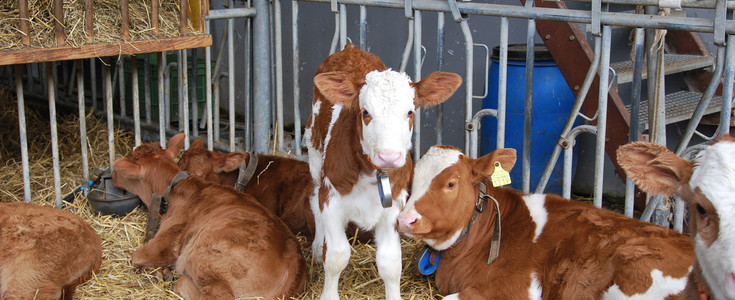UH 066 450 European Master in Animal Breeding and Genetics (National Degree)

Brief description
The European Master in Animal Breeding and Genetics aims to offer high quality training, both in terms of scientific knowledge as well as in didactic skills in the area of animal breeding and genetics.
The focus of the European Master in Animal Breeding and Genetics (EMABG) is on the development of sustainable breeding programmes for farm animals, fish and companion animals. The master's programme offers high quality training in the field of animal breeding and genetics. It can be followed either entirely at BOKU University (Mobility track 1: National Degree) or as an international master's programme “European Master in Animal Biodiversity and Genomics” (Mobility track 2: International Master's Programme), offered at six leading European universities.
EMABG fills a real need for the industry sector and the whole society. It is designed to answer the scientific, practical and societal challenges of animal breeding and genomics. These challenges can be summarised for both developed and low-income countries as follows:
- meet the increased demand for animal and fish products, while preserving or improving the quality of the products, the welfare of animals and minimizing the environmental impact;
- preserve natural resources, with special attention to biodiversity;
- make efficient use of novel tools and technologies to reach these goals while maintaining social acceptance of animal breeding;
- develop sustainable animal breeding programmes that contribute to improved livelihood of farmers and efficient food chains;
- develop sustainable breeding programmes that contribute to improved health and welfare of companion animals, including populations in zoos and nature reserves.
Admission
Graduates of the bachelor’s programmes in Agricultural Sciences offered by BOKU University and Equine Sciences offered by University of Veterinary Medicine, Vienna in cooperation with BOKU University are eligible for admission with no further requirements.
For graduates of other bachelor’s programmes, mastery of the following learning outcomes is required for admission:
- Knowledge and skills in the basics of agricultural sciences, i.e. chemistry, physics, mathematics or statistics, zoology or anatomy and physiology of farm animals, botany, microbiology, genetics and economics.
- Knowledge and skills in the basics of animal production, i.e. animal breeding, animal nutrition, animal husbandry, crop production or pasture management.
In addition, knowledge of English at level B2 (Common European Framework of Reference for Languages) is required.
Detailed requirements are to be found on the BOKU study services website and in the curriculum.
Structure of the national programme
The following compulsory courses are required to complete the master’s programme:
- Applied statistical methods in livestock sciences (7 ECTS credits)
- Genetics of diversity (3 ECTS credits)
- Quantitative animal genetics (6 ECTS credits)
- Molecular animal genetics (3 ECTS credits)
- Master’s thesis seminar (2 ECTS credits)
In addition, elective courses worth a total of 51 ECTS credits, free electives worth a total of 18 ECTS credits and a master’s thesis worth a total of 30 ECTS are required (see the curriculum for further information).
Basic Data
Programm classification no.:
UH 066 450
Duration:
4 Semester - 120 Credits
Degree:
MSc
Registration

Study Programme Coordinator
Assoc. Prof. Priv.Doz.Dr. Gabor Meszaros
Curricular Committee AW

